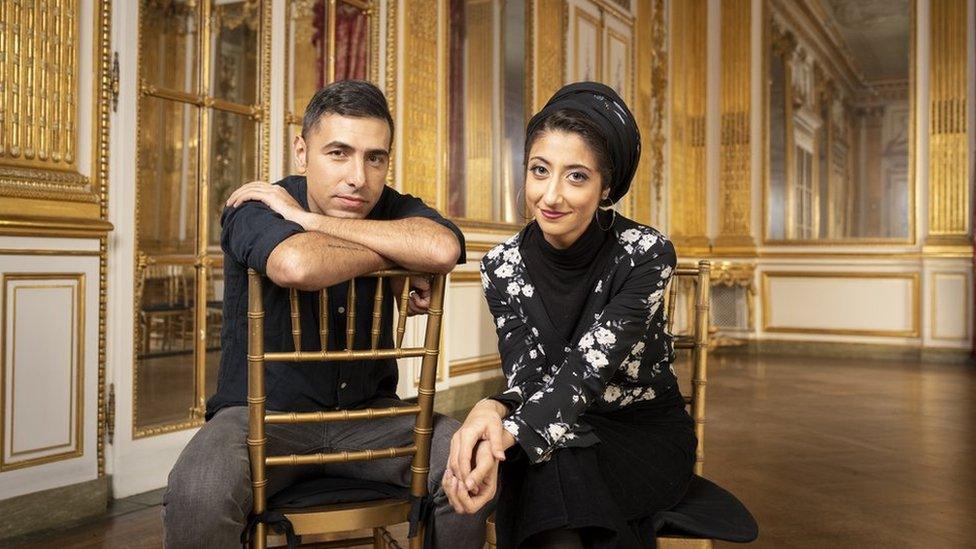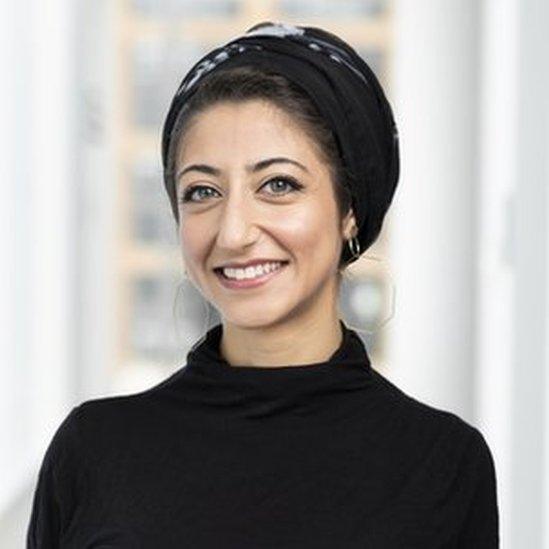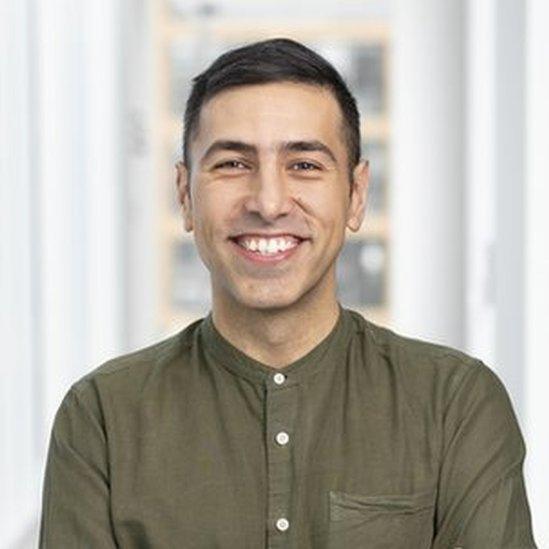The immigrants telling stories history missed
- Published

Ramtin (left) and Rund are Americans with ancestral roots in the Middle East
Two young radio producers are about to move from behind the scenes to in front of the microphone, launching a podcast that spotlights stories we miss in our history books.
In the first episode, Ramtin Arablouei and Rund Abdelfatah tell the story of the coup against Mohammad Mosaddegh, the nationalist prime minister of Iran in the early 1950s.
"The only reason we are here in the US is because of what the US did to our democracy in 1953," Ramtin quotes his father as saying, as he explains the US-orchestrated coup that triggered decades of mistrust between the two countries.
The aim of their programme, which is called Throughline on National Public Radio (NPR) is to draw "a line from the past to the present".
Both first-time hosts are Americans with Middle-Eastern backgrounds - Ramtin is from Iran and Rund's parents are Palestinian and her name is Arabic.
They are proud of their heritage. You can hear it when they introduce themselves. Rund says they had a "big conversation" about their names. She recorded some Anglicised versions, pronouncing it more slowly, shortening the A sounds in her surname and reducing the depth of the H sound.
"It feels like this is how I've heard reporters with slightly exotic names say their names on air," she says.
Ultimately, they went with the way they know themselves. Like the BBC, NPR supports on-air staff who want to pronounce their names as they would in their native language.
But not all of their audience appreciate this policy. Lulu Garcia-Navarro, one of the NPR hosts, wrote a thread on Twitter to address the concerns of a listener who was accusing her of "racism" because when it comes to "Theresa May" she does not pronounce her name with "Cockney accent".
Allow X content?
This article contains content provided by X. We ask for your permission before anything is loaded, as they may be using cookies and other technologies. You may want to read X’s cookie policy, external and privacy policy, external before accepting. To view this content choose ‘accept and continue’.
The situation can become even more complicated for people with names common in Islamic countries. After all, we are living in an era in which some supporters of the US president want to "send back" a Muslim member of the Congress to the country she was originally coming from because they don't see her as their fellow American.
There is another difference between Latino and Arabic or Persian names. Growing up in the US, you probably will hear a lot about Spanish and Latino icons, Christopher Columbus, Jennifer Lopez, Shakira.
It's not the same for Middle Eastern cultural icons. People with Middle Eastern backgrounds do not see much of themselves in the good side of everyday life in the West.
But Rund thinks that NPR was excited about having hosts like them.
"This surprised us a little bit," she said. "They are really excited that we look different, that we had different backgrounds."

Already, their approach to history has incited some harsh feedback.
"Your show is just about how much US has been terrible in the past" says Ramtin quoting some of the feedback they get.
He says this has never been their intention, but the goal is to offer a narratives of history that "unfortunately most school kids are not exposed" to.
In their show, Rund and Ramtin try to talk about people who are underrepresented in American society. Their stories, related to current news, feature forgotten people, events, trends, and policies. Like the episode American Exile, in which they tell the story of people who fled the US because of slavery and those who left because of its abolition.
In another episode they talked about the history of African American athletes who resisted segregation and racism. And they have a whole episode about the Shia and Sunni conflict, which most people think was there for thousands years, but is in fact a much younger issue.
What happened in the past "is not villains and heroes", says Rund, and she wants their audience to think "maybe" the actions that the US took "had consequences that reverberated till now" .

As a young person in school, Ramtin says on the show, the narrative he was taught was that Western civilisation was shaped by "white European men".
His parents provided an alternative narrative, one filled with contributions of Iranian and Islamic scholars like Avicenna. This made him question what other things were missing from the history narrative.
Far from their motherland, immigrant families often feel the need to prove they are one big element of the American melting pot.
Growing up in the US, Ramtin and Rund experienced that in their own families.
That's maybe why Throughline helps minorities see themselves along with their contributions and struggles in that show.
And for others it is an opportunity to see things differently.